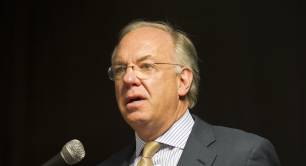Dutch corporate Royal DSM reveals 'responsible business' quandry
A revealing insight into the difficulties of ensuring that a big corporate business is both responsible and profitable was given in Oxford at the Emerge conference, held at the Skoll Centre for Social Entrepreneurship on 12 and 13 November.
The Oxford event aimed to explore ideas to create a more socially and environmentally responsible world.
In a session called ‘Re-booting business for the 21st century’, Jeff Turner, vice-president of corporate responsibility at Royal DSM, said that the company was struggling to find the balance between profit and purpose.
Turner was succinct about the challenges involved with DSM’s investors: “The financial community don’t look beyond that profit imperative, they don’t look beyond the short-term return. That’s a real challenge when you are purpose driven.”
Royal DSM was founded to mine coal (DSM is an acronym for ‘Dutch State Mining’) but now operates in the field of nutritional food supplements and materials such as plastics and electronics.
The company website states that it is ‘driving economic prosperity, environmental progress and social advances to create sustainable value for all stakeholders simultaneously’. It has annual sales worth €10bn and 25,000 employees.
Turner expanded on the challenges of producing profit and purpose by talking about some of the different relationships that DSM has – both the United Nations World Food Programme and big food companies like Nestlé and Mars. He had plenty of unanswered questions.
“How do you bridge between those two extremes? How do you reach the next billion of consumers that need to emerge from extreme poverty? How do you provide a solution to them, that they can aspire to, that they can afford?
“That is never going to be as profitable as building a business with Mars or with Nestlé, so how do you find the resources to do that and how do you hide those resources so that your investors don’t come knocking on the door, asking what you are doing? The financial community is not yet willing to recognise and value that kind of behaviour.”
Whilst admitting that, “transforming mindsets and attitudes is not the same as transforming a portfolio”, Turner went on to present a picture of what he thought was needed to be successful at transforming a business: passionate leadership, dedicated change agents, an environment that rewards the right kind of change and a way of building that community internally.
“We don’t yet have the concrete organisation around the change agents or the community that allows those people to thrive. We are a work in progress,” he admitted.
Turner also said that DSM being classed in the chemical sector by the investment community was making it difficult to attract the kind of investors that bought into the company’s purpose.
Photo credit: Fisher Studios



